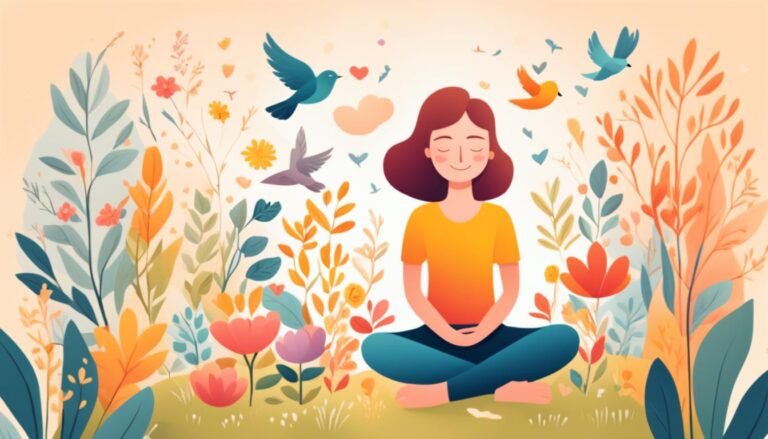Respecting Self and Others: Upholding Dignity and Worth in Interactions
“Respect for ourselves guides our morals, respect for others guides our manners.” – Laurence Sterne
Welcome to a path of self-discovery and empathy. Here, we look at how respect affects our lives. It is easy to focus on doing well for ourselves alone. But, we should keep in mind the importance of treating everyone with respect. By valuing ourselves and others, we can grow personally, improve our relationships, and our communities can be happier.
This part is all about the basics of respect. We will talk about self-esteem, walking in someone else’s shoes, being nice, knowing our feelings, setting limits, being okay with differences, solving problems well, and being honest. These are the building blocks for making a world where everyone feels welcome and valued.
Key Takeaways:
- Respect for ourselves and others forms the foundation for moral and social conduct.
- Self-esteem, empathy, and kindness are key elements in promoting a culture of respect.
- Emotional intelligence helps us understand and navigate diverse perspectives in a respectful manner.
- Setting personal boundaries is crucial for maintaining mutual respect and healthy relationships.
- Embracing diversity and resolving conflicts with integrity are essential in fostering respectful interactions.
Understanding Self-Respect and Its Impact on Interactions
Self-respect is key for how we treat others and build good relationships. When we think highly of ourselves, we naturally want to show respect to everyone around us.
Self-esteem is very important. It affects how we see ourselves and expect others to treat us. With high self-esteem, we can set boundaries that protect our values.
These boundaries keep us safe in relationships. They make sure no one crosses the line and that we are treated as we should be.
“Respecting ourselves and others starts with recognizing our self-worth. It’s about honoring our values, setting personal boundaries, and upholding our integrity in every interaction.” – Dr. Maya Thompson
Integrity is also crucial for self-respect. It means living by our values, being honest, and keeping our promises. With integrity, we show we’re reliable and earn the trust of others.
Understanding self-respect, boundaries, and integrity helps us have better relationships. When we value and respect ourselves, we build a caring and respectful community around us.
Let’s look at why showing empathy to others matters. It strengthens how we respect each other.
Cultivating Empathy for Others
Empathy is key for good interactions. It lets us really get others’ feelings and thoughts. To build empathy, kindness and knowing our emotions are crucial.
Showing kindness is where empathy starts. It means being caring and open to everyone, no matter what. Being kind could be as simple as lending a hand or truly listening when someone is struggling.
Understanding our feelings and others’ is emotional intelligence. This skill helps us to really connect with others by understanding their emotional state.
“Empathy is about standing in someone else’s shoes, feeling with his or her heart, seeing with his or her eyes. Not only is empathy hard to outsource and automate, but it makes the world a better place.” – Daniel H. Pink
With empathy, we tune into what others feel and need. This makes us more mindful of how we affect others. It helps us to be kinder, no matter the differences, making our society better.
Nurturing empathy, kindness, and emotional smarts can change the world around us. Empathy isn’t just feeling for others, it’s acting with respect too. It helps us grow and connects us in a positive way.
Building Tolerance and Acceptance in Interactions
To create a respectful culture, embracing tolerance and acceptance is key. Tolerance helps us see and honor the many viewpoints and values in society. Accepting these differences builds a space for understanding and empathy.
At the core of tolerance and acceptance is valuing diversity. Our global community is rich with people from different backgrounds. Instead of barriers, we should see these differences as chances to grow and learn. Understanding and valuing diverse opinions fosters empathy and inclusiveness.
Empathy is essential for promoting tolerance and acceptance. It lets us step into others’ shoes, sharing their experiences and emotions. This skill helps us move beyond our own biases, treating others with care and an open mind.
Quote:
“Empathy is the ability to understand and share the feelings of others. It is the foundation upon which tolerance and acceptance are built.” – Michelle Obama
By making tolerance and acceptance key in our interactions, we make everyone feel valued. This boosts our relationships and helps society grow together harmoniously.
- Tolerance helps us celebrate diversity and see different views positively.
- Acceptance creates a welcoming space where respect thrives.
- Empathy deepens our connections with others, improving understanding.
The path to tolerance and acceptance starts with ourselves. When we practice empathy, welcome diversity, and hold acceptance dearly, we better the world around us.
Nurturing Emotional Intelligence for Better Relationships
Emotional intelligence is key to keeping relationships strong and happy. It helps us understand and connect with others better. This understanding goes way beyond just talking.
Empathy is a huge part of emotional intelligence. It means feeling what others feel. Walking in their shoes and understanding their joy or pain. It builds compassion and trust, bringing people closer.
“Empathy is about finding echoes of another person in yourself.” – Mohsin Hamid
Having empathy makes us better at helping others. It creates trust and understanding. This is great for working through tough times together.
Another big deal is solving conflicts well. Emotional intelligence helps us face arguments with grace. It’s about understanding others and our own feelings. This way, we find solutions that work for everyone.
Solving conflicts in a good way makes relationships stronger. It’s not just about fixing fights. It’s about talking openly, working together, and respecting each other.
It’s not easy to learn emotional intelligence, but it’s worth it. It’s about knowing yourself, controlling your actions, and understanding others. Working on these skills improves how we get along with people.
The Importance of Emotional Intelligence in Relationships
Emotional intelligence is a big deal in any relationship. It lets us:
- Be there for others in a way they need us to.
- Talk without arguing, and understand each other better.
- Stay calm and make good choices, stopping fights before they start.
- Deepen trust and create real closeness with the people we care about.
Working on your emotional intelligence makes your relationships better. It’s all about understanding others, solving problems together, and growing as a person.
Setting and Maintaining Personal Boundaries
Respecting yourself and others begins with marking out clear personal boundaries. These boundaries define what’s acceptable and off-limits, showing others how they should treat us. They are vital for keeping our self-esteem high and our relationships healthy.
When you make your own boundaries, think about what you need and what matters to you. Know what situations make you feel at ease, secure, and respected. Look deep at your values and what’s important to you. This will help you shape boundaries that make you feel good about yourself.
“Personal boundaries are the limits we set for ourselves and communicate to others about what is acceptable and what is not.”
Talking openly is crucial to setting boundaries. Make your needs and limits clear so people know how to treat you. It’s okay to firmly state what you’re comfortable with and what you’re not. This isn’t being selfish. It’s looking after your own happiness and making your relationships better.
It’s key to stick to your boundaries once you’ve set them. If someone crosses a line, let them know it’s not okay. This shows you value yourself and want respect. Sticking to your limits tells others you mean what you say.
Setting and maintaining personal boundaries is crucial for promoting self-respect and respect for others.
Respect for boundaries goes both ways. Just as you hope others will respect your limits, you must respect theirs as well. Don’t pressure or disrespect what others ask for. Show you understand when people share their boundaries with you.
By defining and sticking to your personal boundaries, you help create a space where everyone knows how to treat each other. This boosts your confidence and ensures clear communication. Boundaries help make strong, respectful relationships possible for everyone involved.
Embracing Diversity and Inclusion
Valuing differences is crucial for harmony and respect. We ensure everyone feels accepted and appreciated for who they are. This leads to a positive environment for all.
Diversity adds a lot to our experiences and ideas. It broadens our understanding of the world. By incorporating varied perspectives, we enhance our thinking and creative abilities.
“Diversity is not about how we differ. It is about embracing one another’s uniqueness.”
Accepting others is a key step in embracing diversity. It means welcoming everyone, regardless of their background. This inclusivity makes people feel like they belong and are valued.
Tolerance is vital for diversity and inclusion. It means respecting different opinions and beliefs. Tolerance leads to open, respectful conversations and stronger connections.
Fostering diversity and inclusion also means respecting oneself and others. It’s about keeping an open mind and fighting against biases. In doing so, we aim for a world of equality and fairness.
The Benefits of Embracing Diversity and Inclusion
There are many upsides to welcoming diversity. Individuals and organizations benefit greatly. Diverse groups make better decisions and solve problems more effectively, using a range of insights.
Innovation thrives in diverse environments. Different experiences and knowledge lead to creative solutions. This creates a culture where everyone can continuously grow and improve.
Furthermore, diversity and inclusion boost employee happiness. Feeling respected at work makes people more driven and committed.
It also enhances a company’s image. Prioritizing equality attracts the best talent and builds customer loyalty. This gives companies an edge in the global market.
In summary, embracing diversity and inclusion is truly beneficial. It’s not just about being morally right. It leads to a more interesting and supportive world, celebrating each person’s unique qualities.
Resolving Conflicts with Integrity
Conflicts are part of any relationship. Healthy ones resolve conflicts the right way. This helps keep peace and understanding. It leads to talking openly, respecting each other, and finding middle ground.
Emotional intelligence is key in handling conflicts. It means knowing and understanding emotions. People with it can deal with conflicts calmly and with empathy. This lowers tension and helps in finding good answers.
“Conflict cannot survive without your participation.” – Wayne Dyer
Integrity is crucial for resolving conflicts. It means doing the right thing even when it’s hard. In conflicts, those with integrity focus on being fair, speaking respectfully, and being honest. They want win-win solutions without being tricky or dishonest.
Handling conflicts rightly calls for listening well, understanding others, and looking for ways to agree. It’s about respecting others’ ideas and feelings, even if they’re different from ours. Sharing common goals can lead to solutions that help everyone and make relationships stronger.
Remember, conflicts can help us grow. Dealing with them using integrity and emotional intelligence can make things better. Talking openly, listening well, and aiming for solutions that benefit all are important. This way, everyone’s value is respected and conflicts are turned into chances for deeper understanding.
The Link Between Respect and Personal Growth
Respecting oneself and others is more than being polite. It’s key for personal growth. When we show respect, we build good relationships and boost our self-esteem. It also helps us set strong personal boundaries and improves our emotional intelligence.
Cultivating Self-Esteem through Respect
Showing respect affects our self-esteem. By acting kindly to ourselves and others, we create a space for high self-worth. Valuing our own needs and limits helps strengthen our self-esteem. This is vital for our growth.
Establishing Strong Personal Boundaries
Respect is crucial for our boundaries. It helps us set clear rules and share them clearly. This way, we defend our well-being and meet our needs. It also means we respect others’ boundaries, leading to better relationships.
Respecting oneself and others is not about conforming or compromising our values. It is about acknowledging each person’s inherent worth and treating them with empathy and fairness.
Cultivating Emotional Intelligence
Understanding our feelings and others’ is emotional intelligence. Respect is a big part of this. Valuing different views expands our empathy. This helps us deeply connect and handle tough situations with care and understanding.
Promoting a Culture of Respect in Different Environments
It’s key to have a culture of respect everywhere, from work and schools to our communities. We should value traits like empathy, kindness, and diversity. With these, we make a place where everyone respects each other.
In work settings, empathy is important. It helps coworkers understand each other better. When teams value kindness and understand each other’s emotions, they work together well. Also, having a mix of different people at work leads to new ideas and solutions.
Schools must teach students to be tolerant and to value everyone’s differences. This makes schools open places for all kids. It’s also vital to teach students about empathy. This helps them get along with others in kind and caring ways.
For communities to shine, they must be built on respect. Making room for many types of people helps everyone get along. It’s about being patient and understanding others. That’s how safe and peaceful neighborhoods are made. Also, kindness and knowing how to handle emotions well make our communities stronger and more connected.
“Respect for ourselves guides our morals, respect for others guides our manners.” – Laurence Sterne
We all play a part in making respect the norm everywhere. By being empathetic, kind, and open to others, we can create welcoming spaces. Let’s use the power of respect to make better communities. This builds stronger bonds and a more open world for everyone.
Role Models for Respecting Self and Others
Role models are key in showing how to respect ourselves and others. They shine with empathy, integrity, and love for all types of people. Following their lead leads to a better world.
Malala Yousafzai is a prime example, being the youngest to win the Nobel Prize. She fights for education, especially for girls, worldwide. Malala is a symbol of courage, sparking change and inspiring millions to speak up.
Nelson Mandela stands out as well, fighting for equality in South Africa. He showed great integrity and love, choosing forgiveness over revenge. His work for unity is a model for everyone, even after years of hardship.
C.S. Lewis highlighted the value of integrity in quiet decisions. Malala clearly reflects this idea. She’s faced grave danger but hasn’t stopped her mission. Her story is a roadmap for staying true to our beliefs, even in tough times.
“Diversity is not about how we differ. Diversity is about embracing one another’s uniqueness.”
Oprah Winfrey is also a hero, using her shows and charity to celebrate different voices. She champions unheard stories, making sure we all have a space. Oprah’s work shows how powerful and essential diversity is for respect.
It’s a must to respect others and ourselves, say these icons. Their empathy, integrity, and love for all are lessons we should follow. Their vision is for a respectful world, where everyone matters.
Conclusion
Respecting ourselves and others is key to a peaceful and unified world. We learned about important steps in this article. These steps include showing empathy, being kind, and having emotional smarts. They help us connect better with others and see things from different angles.
It’s crucial to set personal boundaries to earn respect and safeguard our health. Also, welcoming differences and making sure everyone feels included make our society stronger. This approach also builds up our patience and open-mindedness.
Solving conflicts well, based on honesty, is essential. This approach guides us during arguments without losing respect. These principles aid in our self-improvement, make our spaces safer, and encourage others to follow in our steps.








